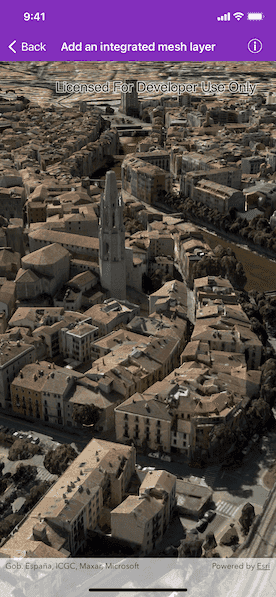View an integrated mesh layer from a scene service.

Use case
An integrated mesh is used to generate a mesh over a point dataset. They are most often used on high-density point datasets to create a high-resolution seamless surface.
How to use the sample
After launching the sample, watch the integrated mesh layer load in place. Navigate around the scene to visualize the high level of detail on the buildings.
How it works
- Create an
AGSSceneobject. - Create an
AGSIntegratedMeshLayerobject with the URL to an integrated mesh layer scene service. - Add the layer to the scene's
operationalLayersarray. - Create an
AGSCameraobject and set it as the viewpoint camera of the scene view.
Relevant API
- AGSIntegratedMeshLayer
About the data
This integrated mesh depicts the city of Girona, Spain and is attributed to the Institut Cartogràfic i Geològic de Catalunya (ICGC). The data was produced from photogrammetrically correct imagery. Areas of white space within the integrated mesh are areas that had poor overlapping coverage from photos.
Additional information
An integrated mesh layer can also be added to a scene from a local data source - either from a scene layer package (.slpk) or a mobile scene package (.mspk).
Tags
3D, integrated mesh, layers
Sample Code
//
// Copyright © 2019 Esri.
//
// Licensed under the Apache License, Version 2.0 (the "License");
// you may not use this file except in compliance with the License.
// You may obtain a copy of the License at
//
// http://www.apache.org/licenses/LICENSE-2.0
//
// Unless required by applicable law or agreed to in writing, software
// distributed under the License is distributed on an "AS IS" BASIS,
// WITHOUT WARRANTIES OR CONDITIONS OF ANY KIND, either express or implied.
// See the License for the specific language governing permissions and
// limitations under the License.
//
import UIKit
import ArcGIS
/// A view controller that manages the interface of the Add an Integrated Mesh
/// Layer sample.
class AddIntegratedMeshLayerViewController: UIViewController {
/// The scene view managed by the view controller.
@IBOutlet var sceneView: AGSSceneView! {
didSet {
sceneView.scene = makeScene()
let location = AGSPoint(x: 2.8259, y: 41.9906, z: 200.0, spatialReference: .wgs84())
let camera = AGSCamera(location: location, heading: 190, pitch: 65, roll: 0)
sceneView.setViewpointCamera(camera)
}
}
/// Creates a scene with an integrated mesh layer.
///
/// - Returns: A new `AGSScene` object.
func makeScene() -> AGSScene {
let scene = AGSScene(basemapStyle: .arcGISImagery)
// Create the elevation source.
let elevationServiceURL = URL(string: "https://elevation3d.arcgis.com/arcgis/rest/services/WorldElevation3D/Terrain3D/ImageServer")!
let elevationSource = AGSArcGISTiledElevationSource(url: elevationServiceURL)
// Create the surface and add it to the scene.
let surface = AGSSurface()
surface.elevationSources = [elevationSource]
scene.baseSurface = surface
// Create the integrated mesh layer that depicts
// the city of Girona, Spain and add it to the scene.
let integratedMeshLayerURL = URL(string: "https://tiles.arcgis.com/tiles/z2tnIkrLQ2BRzr6P/arcgis/rest/services/Girona_Spain/SceneServer")!
let integratedMeshLayer = AGSIntegratedMeshLayer(url: integratedMeshLayerURL)
scene.operationalLayers.add(integratedMeshLayer)
return scene
}
// MARK: UIViewController
override func viewDidLoad() {
super.viewDidLoad()
// Add the source code button item to the right of navigation bar.
(navigationItem.rightBarButtonItem as! SourceCodeBarButtonItem).filenames = ["AddIntegratedMeshLayerViewController"]
}
}